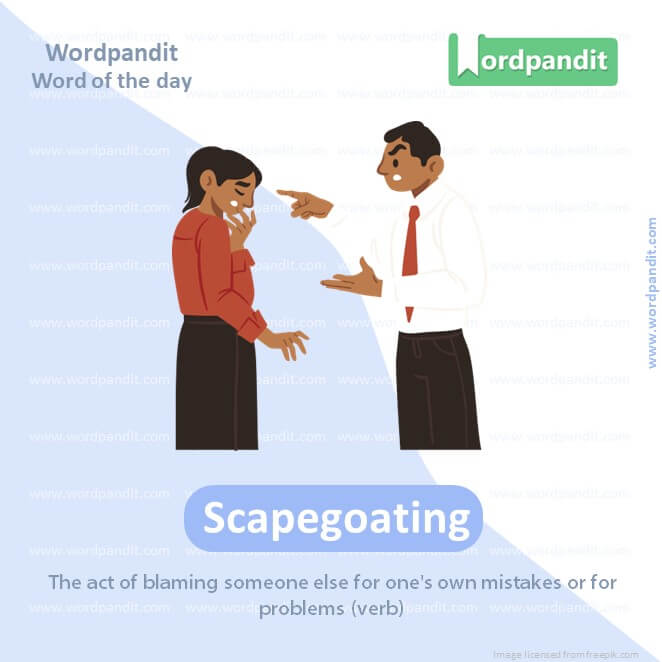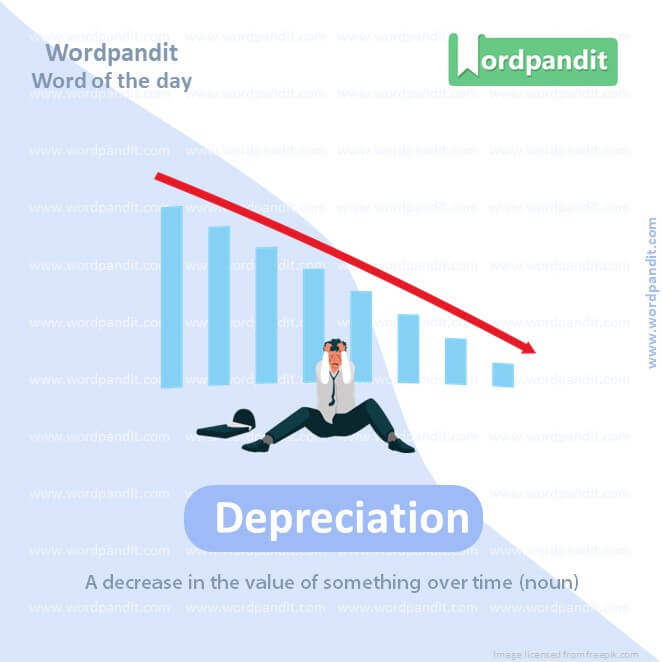Daily Vocabulary Words: List of Daily Used Words
Hi there. Welcome to this special section @ Wordpandit.
Our endeavour here is straightforward: highlighting important daily vocabulary words, you would encounter in The Hindu. This is your repository of commonly used words; essentially, we are posting a list of daily used words. Hence, this has significant practical application as it teaches you words that are commonly used in a leading publication such as The Hindu.
Visit the website daily to learn words from The Hindu.

WORD-1: Appreciably
CONTEXT: The key infrastructure industries, from cement and coal to steel and electricity, show the average year-on-year growth in production eased appreciably to a four-month low of 8.1% in September, from the 12.5% pace posted in August.
SOURCE: The Hindu
EXPLANATORY PARAGRAPH: Imagine you have two piles of cookies. One pile has just 2 cookies, but the other pile has 10 cookies. The difference between these piles is big, right? So, we can say the number of cookies has increased “appreciably” in the second pile. “Appreciably” is like saying “a lot” or “a noticeable amount”.
MEANING: In a way that can be clearly seen or felt (adverb).
PRONUNCIATION: Uh-PREE-suh-bly
SYNONYMS: Significantly, notably, remarkably, considerably, noticeably, markedly, substantially.
USAGE EXAMPLES:
1. Her health improved appreciably after she started exercising.
2. The price of the car is appreciably higher than last year’s model.
3. He appreciably increased the number of books he read this month.
4. After the rain, the temperature dropped appreciably.

WORD-2: Succour
CONTEXT: The advance estimates for lower kharif output, disconcertingly flag the fact that the farm sector may be able to offer little succour as rural incomes get hit.
SOURCE: The Hindu
EXPLANATORY PARAGRAPH: Imagine you’re trying to carry a big, heavy box and it’s really hard. Then, your friend comes over and helps you lift it. Your friend gave you “succour”, which means help or support.
MEANING: Help and support in times of hardship or distress (noun).
PRONUNCIATION: SUH-kur
SYNONYMS: Aid, assistance, relief, help, support, comfort, solace.
USAGE EXAMPLES:
1. The villagers provided succour to the flood victims.
2. She was a source of succour during my difficult times.
3. The charity aims to give succour to the homeless.
4. After the accident, bystanders rushed to provide succour to the injured.

WORD-3: Scapegoating
CONTEXT: Pakistan is doing is scapegoating tens of thousands of poor Afghan refugees for the failures of its own policies.
SOURCE: The Hindu
EXPLANATORY PARAGRAPH: Imagine if something breaks in your house and everyone blames your little brother, even if he didn’t do it. That’s like “scapegoating”. It’s when people blame someone else for something they didn’t do.
MEANING: The act of blaming someone else for one’s own mistakes or for problems (verb).
PRONUNCIATION: SKAYP-goating
SYNONYMS: Blaming, accusing, finger-pointing, charging, faulting, holding responsible, imputing.
USAGE EXAMPLES:
1. The company was notorious for scapegoating its employees for management failures.
2. She felt like she was always being scapegoated for her sister’s mistakes.
3. The government tried scapegoating outsiders for the economic crisis.
4. Instead of finding a solution, he spent his time scapegoating his colleagues.

WORD-4: Depreciation
CONTEXT: A balance of payment crisis and high rupee depreciation.
SOURCE: The Hindu
EXPLANATORY PARAGRAPH: Let’s say you have a brand-new toy car. But after playing with it for a year, it has some scratches and isn’t shiny anymore. That toy car has lost some of its value. This loss of value is called “depreciation”.
MEANING: A decrease in the value of something over time (noun).
PRONUNCIATION: Dih-PREE-shee-ay-shun
SYNONYMS: Devaluation, decline, decrease, reduction, diminution, loss of value, degradation.
USAGE EXAMPLES:
1. The car undergoes rapid depreciation in its first few years.
2. Due to depreciation, the machinery is now worth less than when we bought it.
3. He noted the depreciation of the property over the past decade.
4. Depreciation is a natural process for most physical assets.

WORD-5: Deterrence
CONTEXT: Israel’s regional hegemony and deterrence against and friendship with Arab countries have not brought peace for Israelis.
SOURCE: The Hindu
EXPLANATORY PARAGRAPH: Imagine you have a big sign outside your house that says “Beware of the Dog!”, even if you don’t have a dog. You put it there so that people think twice before trying to enter your house without permission. That sign acts as a “deterrence”, something that discourages or prevents someone from doing something.
MEANING: The act of discouraging or preventing a certain action by instilling fear or doubt (noun).
PRONUNCIATION: Dih-TUR-rens
SYNONYMS: Prevention, discouragement, disincentive, intimidation, restraint, hindrance, inhibition.
USAGE EXAMPLES:
1. The new security measures act as a deterrence to potential thieves.
2. Nuclear weapons are often seen as a form of deterrence against aggression.
3. The high fines serve as a deterrence against littering in the park.
4. The aim of the policy is deterrence, not punishment.
WORD-6: Secrecy
CONTEXT: “The great secrecy made this operation greatly successful.”
SOURCE: The Hindu
EXPLANATORY PARAGRAPH: Imagine you have a special box where you keep all your treasures and you don’t want anyone to know what’s inside. You keep it a secret. “Secrecy” is like that special box. It’s when something is kept hidden or unknown.
MEANING: The state of being kept hidden or unknown (noun).
PRONUNCIATION: SEE-kruh-see
SYNONYMS: Confidentiality, privacy, silence, discretion, concealment, covertness, stealth.
USAGE EXAMPLES:
1. The organization operates in complete secrecy.
2. She was sworn to secrecy about the upcoming event.
3. They maintained the secrecy of the surprise party.
4. Secrecy is crucial for this undercover operation.
WORD-7: Burgeoning
CONTEXT: Top Indian talent is increasingly attracted to the burgeoning IT sector, emerging biotech, and related fields — and not to academe — both within India and abroad.
SOURCE: The Hindu
EXPLANATORY PARAGRAPH: Think of a little plant that starts to grow bigger and bigger every day. When something is growing or increasing quickly like that plant, we say it’s “burgeoning”.
MEANING: Growing or developing quickly (verb).
PRONUNCIATION: BUR-juh-ning
SYNONYMS: Expanding, flourishing, booming, mushrooming, thriving, escalating, proliferating.
USAGE EXAMPLES:
1. The burgeoning population of the city posed challenges for the government.
2. She’s an expert in the burgeoning field of digital marketing.
3. The town has been struggling to accommodate its burgeoning tourism industry.
4. Their love for each other was burgeoning day by day.
WORD-8: Exaggeration
CONTEXT: It would not be an exaggeration to say that the IITs are in crisis.
SOURCE: The Hindu
EXPLANATORY PARAGRAPH: Imagine you caught a fish and you tell your friends it was as big as a shark, when it was actually just a small fish. That’s an “exaggeration”. It means saying something is bigger, better, or more than it really is.
MEANING: A statement that makes something seem larger, better, or more important than it really is (noun).
PRONUNCIATION: Ex-aj-uh-RAY-shun
SYNONYMS: Overstatement, hyperbole, magnification, amplification, embellishment, overemphasis.
USAGE EXAMPLES:
1. Claiming that he’s the best player in the world is a clear exaggeration.
2. She has a tendency towards exaggeration when telling stories.
3. It’s no exaggeration to say that this event will be historic.
4. I thought he was using exaggeration, but the mountain really was that tall.
WORD-9: Inimical
CONTEXT: There was less desire to engage with such groups and globally, counter-terror strategies aimed at the elimination of all violent groups inimical to the various states they operated in.
SOURCE: The Hindu
EXPLANATORY PARAGRAPH: Imagine there’s a character in your favorite story who’s always trying to stop the hero. This character is not friendly and is harmful to the hero. That character is “inimical”, which means harmful or unfriendly.
MEANING: Harmful in effect or tending to oppose (adjective).
PRONUNCIATION: In-IM-i-kul
SYNONYMS: Harmful, detrimental, injurious, adverse, hostile, antagonistic, unfriendly.
USAGE EXAMPLES:
1. Smoking is inimical to health.
2. Their actions were inimical to our interests.
3. The environment there is inimical to plant growth.
4. He had an inimical relationship with his competitors.
WORD-10: Pledging
CONTEXT: She further read out a statement issued by author Arundhathi Roy, pledging solidarity with the Palestinian people.
SOURCE: The Hindu
EXPLANATORY PARAGRAPH: Imagine you promise your friend that you’ll help them clean their room. That promise is like a “pledge”. So, when you’re “pledging”, you’re making a serious promise to do something.
MEANING: Making a serious promise or commitment to do something (verb).
PRONUNCIATION: PLEJ-ing
SYNONYMS: Promising, committing, vowing, swearing, assuring, guaranteeing, undertaking.
USAGE EXAMPLES:
1. She is pledging a significant amount of money to the charity.
2. Students are pledging to maintain the honor code.
3. He’s pledging his support for the new policy.
4. Many countries are pledging to reduce carbon emissions by 2030.
Vocabulary Grammar
The journey of language mastery is a thrilling blend of words and structure, often referred to as ‘vocabulary grammar’. These critical components of any language work hand in hand to facilitate meaningful communication. However, embracing ‘vocabulary grammar’ requires a nuanced understanding and a strategic learning approach.
The initial step towards understanding ‘vocabulary grammar’ is to study the functionality of words in a sentence. Grammar holds the key to how vocabulary is structured in language. Therefore, observe how words change or influence meaning when placed differently in a sentence.
Leveraging diverse resources is a great way to grasp ‘vocabulary grammar’. Engage with a range of reading materials, audio-visual resources, and interactive language apps. This offers genuine exposure to ‘vocabulary grammar’ in real-world contexts and enhances comprehensive learning.
While learning ‘vocabulary grammar’, it’s important to see vocabulary and grammar as interconnected. Understanding how different parts of speech function can help in the effective usage of vocabulary. Try creating your own sentences using new vocabulary following certain grammatical rules to reinforce learning.
Revision holds its due significance in mastering ‘vocabulary grammar’. Regular review of learnt grammar rules and vocabulary ensures long-term retention and bolsters understanding. Use techniques like spaced repetition to make your review sessions more effective.
Lastly, practicing ‘vocabulary grammar’ is key to cementing your knowledge. Whether it is through writing exercises or conversing in the language, practicing allows you to apply ‘vocabulary grammar’ in a practical context and aids in accurate language use.
In conclusion, understanding ‘vocabulary grammar’ calls for conscious observation, diversified resources, interconnected learning, regular revision, and relentless practice. As you navigate this path, you will see ‘vocabulary grammar’ like two sides of the same coin, both essential to the value it holds in the wealth of language learning.









